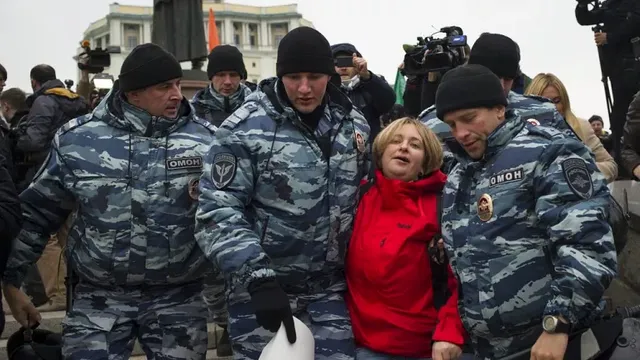
Russian police detain an anti-war protester in October
Is this an unpopular invasion imposed on defenseless Russian society, or is this just wishful thinking? Can we believe everything we see in Russian polls?
A great paradox surrounds the Russian invasion of the Ukraine.
On the one hand, observers across Europe insist that this is President Vladimir Putin's war, imposed on Russian citizens, who have little say in the matter.
But is this just an illusion?
Others suggest that Russia's war could not be fought without significant popular support, recalling polls indicating a high level of public support, along with a conspicuous lack of dissent.
"When the war broke out, support was really high," Elena Koneva, a researcher at Russian opinion polling company ExtremeScan, told a recent event organized by Open Democracy.
He cited polls showing a fifty/fifty split between those in favor of the conflict and those against it, while others suggested that two-thirds of the population supported it.
"I can understand why people can support Putin or accept, without protest, injustice or cruelty... but it is very difficult to understand how they can support this war," Koneva said, calling the results "very painful."
An important topic for the whole world
However, there are obvious problems with the surveys. In authoritarian systems, where citizens often cannot freely express what they think, real public opinion is rarely seen.
Not only are most Russian opinion polls conducted by state-controlled research institutes - which means the results can be manipulated - but the Kremlin fiercely represses anti-war dissent in Ukraine.
The Kremlin's version of the development of the war in Ukraine
Critics of the "special operation," as it is known in Russia, have been the target of numerous fines, arrests and violence. For example, a father was arrested for his daughter's alleged anti-war drawings at school.
Even if ordinary Russians support the invasion, Elena Koneva says there are questions about what this support means in practice. He points out that the polls in which they say they are in favor, when they ask secondary questions like if they would join the military or donate money to the cause, the answer of the participants is a resounding NO.
So what does that support mean? he wonders.
We don't really like those in power either and we don't understand them,' Zhuravlev told participants in the Open Democracy event.
Viewing themselves as "too incompetent" and "unable to understand politics", Zhuravlev believes that ordinary citizens hope that their seemingly more enlightened leaders have reason to start the war, believing that "it is impossible to start anything like this without onereason".
Many Russians suffered terribly under the regime of the Soviet Union. Millions perished in Joseph Stalin's purges during the 1930s. Society has remained totally controlled ever since, with freedom of expression and dissent severely suppressed.
At the same time, Zhuravlev comments that there is "a moral sensitivity" towards violence that can put people in a bind.
"They cannot enthusiastically support the war because it is immoral," he explained. "But they can't become strong opponents... because it's too politicized. That's why they often develop an argument that this war was inevitable. They see it as a natural disaster."
The Kremlin has repeatedly claimed that if Russia hadn't attacked Ukraine, Kiev or the West would have attacked Russia first, an idea, Zhuravlev says, that is repeated all the time by ordinary Russians. of characterinevitable of the contest".
Justifications for everything
Even as the bloodshed continues to wreak untold suffering on both Russia and Ukraine, Russia's poll support for the war has remained stable.
Researcher Koneva attributes this to how the war is portrayed within the country.
"I'm very impressed with the Russian propagandists," she says, explaining that they managed to create a "distorted perception that kills objective facts."
They have done this by describing every negative event, be it a death or a withdrawal, as an attempt to protect the Russian people. Although support is still highly dependent on military success, this has created a dynamic where "the more losses they suffer, the more they consolidate under Putin's banner."
In the border areas, there are higher levels of support for the invasion. The inhabitants of these areas consider that the country is under a greater threat than those in those furthest away from the fighting.
But nothing is immovable
"People can change their attitude and be more radical or more moderate," Zhuravlev believes, though he warns against trying to force a change of heart:
"Even if you lose a child or a husband, you can be more indignant with those in power, but at the same time you can come to the conclusion: if we pay this price, we need a victory to justify it... Otherwise, how can we continue to live?" ".
"You never know exactly how all this will affect people's minds."